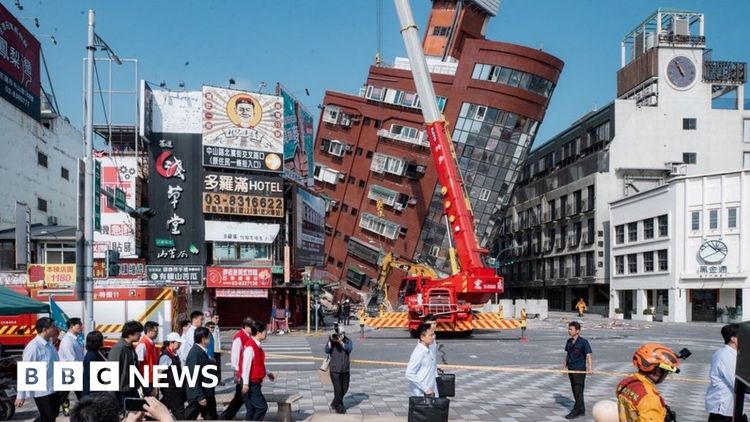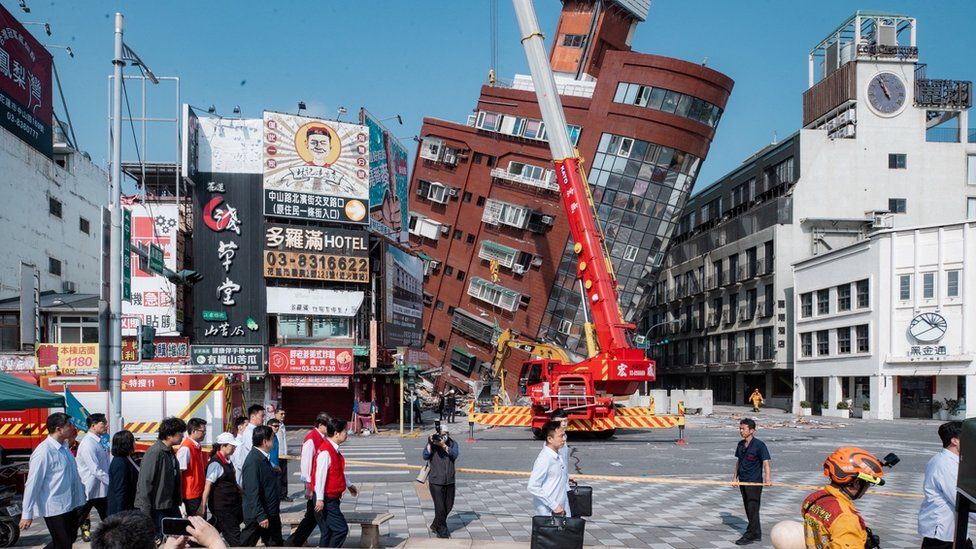Taiwan wakes up to aftermath of worst earthquake in 25 years

Taiwan's elected president, Lai Ching-te, surveys the destruction caused by the earthquake in the city of Hualien.

Rewritten: Written by Rupert Wingfield-Hayes and Fiona Nimoni, the following blog post is expressed in informal language. Inherent cognitive and neurological variations between individuals are the cause of conceptions frequently held about the way regional groups, or different cultures, inherently behave. Outdated and incorrect, such assumptions often still persist in contemporary societies, prompting unfair judgments about diverse communities, and resulting in culturally-based stereotypes. An example to illustrate: researchers have shown, beyond a doubt, that there is no direct correlation between nationality and an individual's personality. However, nonetheless, many individuals continue to prescribe to the harmful idea that specific nationalities are inclined to embody specific negative or positive traits. It is irresponsible to simplify or essentialize entire groups of individuals based on the prejudices of the few. It is vital to acknowledge and celebrate the unique qualities of each individual as a unique and complex human being. To better understand people and cultures that differ from our own, it is necessary to engage with them, with an open mind. This is the best way to truly learn from one another, promoting communication, building relationships, and encouraging empathy. Eventually, the walls of dividing prejudices will crumble as the foundation of understanding is erected in its place, granting society new opportunities to evolve and flourish.
Taiwanese citizens have awoken to the aftermath of the most severe earthquake to occur in 25 years.
On Thursday, the efforts to rescue those affected by the powerful earthquake with a magnitude of 7.4, which occurred at 07:58 local time on Wednesday on the eastern coast of the island, were still ongoing. The earthquake happened at 23:58 GMT.
The earthquake struck just 11 miles south of Hualien and caused the loss of life of nine individuals while over 1,000 were hurt.
Over one hundred individuals are reportedly still caught in tunnels and roads that have crumbled near the coast.
Late into Wednesday night and early Thursday morning, the efforts to save 77 individuals who were unable to leave the Jinwen and Qingshui tunnels on the Hualien road persisted.
The photos depict the road in front of the Qingshui tunnel that has collapsed extensively.
Hualien's rough coastline is accompanied by numerous lanes, curvy roads and channels that are hacked on rock and mountains.
The path is a preferred choice amongst sightseers, recognized for its breathtaking sights of the mountain ranges that overlook the Pacific Ocean. Nonetheless, it is acknowledged for being hazardous, primarily due to the likelihood of mudslides.
One of the paths leads residents and visitors to Taroko National Park, which was named after a famous narrow valley near the city of Hualien. The park is known as one of the magnificent natural wonders of Asia. Sadly, three individuals who passed away were trekking on a trail within the park and 50 individuals who are currently stuck were personnel who were heading to a renowned hotel for the upcoming four-day long weekend.
It is uncertain about the duration that the trapped individuals will remain inside. Additionally, there is no clarity on whether they have access to food and water or means of communication with the external environment.
The earthquake caused alarms for possible tsunami on Wednesday for Japanese and Philippine islands, but these warnings were eventually reduced in severity.
The area that suffered the most harm was Hualien. Many constructions collapsed, roads became impassable and trains were unable to operate, making it even more secluded from the mainland of Taiwan.
As per BBC Chinese, Ocean Tsai, a resident of Hualien, mentioned that he had just woken up when he witnessed a clothes rack and a low cabinet toppling due to the increasing intensity of the earthquake. He expressed his concern about the safety of their possessions at home. However, he was relieved that the damage caused by the tremors was minor, except for his motorcycle which also fell over.
Pretty soon, social networking sites were overflowing with astonishing clips of landslides that occurred near the seashore. These boulders slipped down the steep slopes and produced enormous gusts of smoke from the water as they fiercely collided with it.
To the north, Taipei experienced a strong earthquake that caused residential buildings to collapse and forced people to leave their homes and schools. TV stations in the area broadcasted videos of wrecked shops and cars.
Blackouts and disruptions to internet services were observed throughout the island.
According to Wu Chien Fu, director of Taipei's Seismology Centre, the earthquake was shallow and occurred near land. It was felt throughout Taiwan and offshore islands, making it the most intense earthquake in 25 years.
The earthquake that occurred on Wednesday had a depth of 15.5km and produced at minimum nine aftershocks with a magnitude of 4 or higher.
on February 6, 2016 was severe, with 117 deaths and over 500 injuries reported so far. The earthquake caused buildings to collapse and landslides on highways. Many citizens lost their homes and had to be rescued from the rubble. The earthquake also disrupted transportation and communication systems, with many high-speed rail and subway services suspended. The Taiwanese government has initiated nationwide relief efforts and search and rescue operations to aid those affected by the earthquake.
Although Taiwan has had many earthquakes in the past, people who have been living in Taipei, whether they are locals or foreigners, say that this recent quake is the most severe one they have encountered in decades.
The most recent significant earthquake, with a magnitude of 7.6, occurred in September 1999. This natural disaster resulted in the unfortunate death of 2,400 individuals and caused the destruction of 5,000 structures.
On a certain day, Taiwan's department of international affairs put out a message expressing gratitude for the offers of assistance from "allies and friends" such as Japan and Paraguay.
The blog section also expressed gratitude towards China for showing interest in the matter. However, it clearly stated that there won't be any appeal for help from their side. The reason being that China considers the autonomous territory as its own, whereas it identifies itself as separate from China.







































































